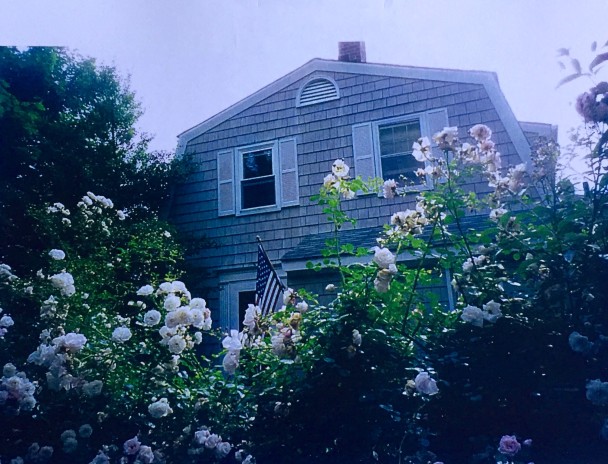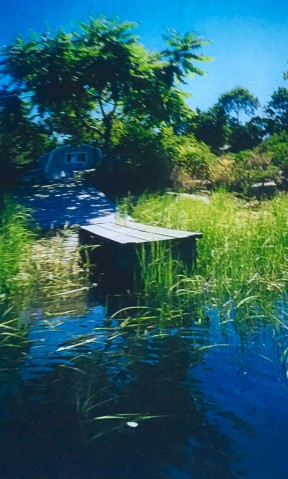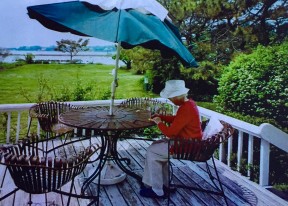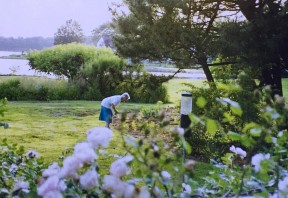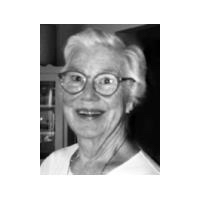
March 28, 2016 4:45 pm “The Love Nest,” by Jean Kinkead Martine, Mother of the Century
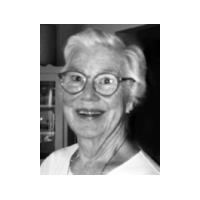 Jean Kinkead Martine (Remy’s Grandmother, Anne’s mother)
Jean Kinkead Martine (Remy’s Grandmother, Anne’s mother)
Anyone who has ever been involved in going from a large, unwieldy ménage to something more in keeping with a diminished household knows there is a surfeit of opinion on the subject and little consensus. Then, once the move is actually made, there is ongoing commentary. Last week I received a letter from a distant classmate who had caught up with our news through the grapevine. “I do hope, Jean,” the letter concluded, “that you have made a wise move.” Who knows? Who ever really knows?
Layng and I had retired from our advertising business, long snugly housed on our vast second floor, and our great old house was sold. Gone the beautiful white rooms with windows looking out to deep lawns and those incredible tall trees. Gone the white-fenced back gardens and the little well house whose hidden spring had seen us through one long parched August. The big cool cellar, whose thick stone walls had absorbed the sounds of unnumbered nights of teenage band practice; the wide garage, home to doll carriages and bikes and later to motorcycles and open-jawed cars in various stages of intensive care – all someone else’s space now.
It had been a long goodbye. Beginning with Layng’s almost offhand “Now we’re unemployed, we really should look into less extravagant housing,” it proceeded at a snail’s pace until a letter from the tax assessor’s office shocked us into action. Our taxes were about to go to the moon, leaving us no option but to move – and quickly. The foot-dragging was over and we went instantly into fast-forward.
The task was Herculean – no other word comes close to doing it justice – beginning with the winnowing. Our five children were in on that. A lot.
“You certainly aren’t giving away Person’s crib! (Our first grandchild’s pet name, short for Persona Grata, tended to surface at emotional moments.) Didn’t you promise him you’d save it for his kids?”
Total recall was rampant. “But you actually said I could leave Aunt Eileen’s furniture with you more or less forever!” “I distinctly remember that my football helmet was to be gold-plated as a fiftieth birthday present.”
Winnow, we did, nonetheless. We rented a dumpster and got rid of decades of squirreling: kindergarten report cards, thousands of faded photographs I had inherited from my parents (who were all those people?), maybe two or three hundred broken things we never got around to fixing, boxes and boxes of letters too wonderful to throw away until we arrived at our everything-must-go mode. The Salvation Army and Goodwill relieved us of rugs and lamps, old dog bowls and leashes, ancient skis and sleds, playpens and crutches. No one wanted our elderly record albums, and I eventually gave them to a reluctant consignee over the protests of our youngest son, the family’s self-appointed prophet, who foresaw their ever-increasing value. “Ma, they’ll be worth a gold mine for you in a few years. They’ll be worth a fortune, mark my words.”
Somehow we thinned it all out. The house was down to its bare bones, relatively speaking. We had it painted and refurbished and it looked absolutely marvelous. We put it on the market and to our astonishment it was sold almost overnight.
The real goodbye came then, and it was gut-wrenching, to put it mildly. It wasn’t just that fierce streak of possessiveness that rose up in me totally without warning: the sudden pain at the thought of someone else sleeping in our room, of other people finding all our secret places – the skylight in the attic that opened to the roof and gave us that spectacular view all the way to Long Island Sound, the cluster of bushes just big enough to hide two small chairs with us and our drinks at summer dusk. No this was something primal – a choking, sobbing, tear-drenched goodbye to all those babies, all that sweet closeness, all that fun.
By moving day, the feelings had spent themselves, and as Our Van was taking things away to storage and Their Van was bringing things in, I felt light of head and heart. I felt foot-loose and emancipated and about 25 years old; something in me had shifted into another gear. It has been this way from that hour. Miraculously, for both of us the letting-go was swift and complete, accompanied by a huge surge of energy propelling us toward the new, the uncluttered, the small.
“Let’s look in Old Greenwich,” said Layng, as we settled into the no-man’s-land of temporary digs. “Why not try for a glimpse of saltwater in our old age?” It was a long- ago dream of ours, so far back in my memory I had almost forgotten it. “Yes!” said I, picturing it already – spare, Shakerish, redolent of the Sound.
Mac, our real estate broker and old friend, told us firmly at the start of our search that we would have to go “way up-country” to find anything near the water in our price range, but of course we didn’t want up-country. We wanted here, nourished by family ties, by people and places dearer to us than all the waters of the earth. We wanted what we wanted, we told Mac, practically stamping our septuagenarian feet.
Saintly Mac kept showing us pretty houses in pretty neighborhoods not too far from Greenwich Point, certain that one of these days we’d find a little landlocked treasure with at least a whiff of salt that appealed to us both. Weekend after weekend I kept combing the newspapers looking, ever looking, for something promising a glimpse of sea. It seemed a vain search as the weeks passed, akin to my adolescent quest for the dream job in the real-world help wanted in the New York Times. Then one Sunday – one magical Indian summer Sunday – I chanced upon an ad!
It was a very low-key little ad tucked away in the Connecticut column of the real estate section, where hyperbole is the mother tongue, and it struck a wondrously peaceful note. “Small House on the Water” read the headline above a dim photo of a rather scruffy bit of lawn and an indistinct stretch of water. “Open House This Weekend.” The description of the house was modest almost to the point of self-effacement, so the price at the very end was a shocker – much more than we had been advised to spend if we wanted a secure retirement.
It was absolutely insane for me to continue peering at that picture. Hadn’t we been told by people whose counsel we respected that the quality of the remains of our day was contingent on the wise investment of the money we had made from the sale of our house? What in the world could I possibly be thinking of, eyes glued to the page and putting on my reading glasses to get a better look. “Small House on the Water” it still said, but this time the words sang like poetry, like something from Yeats, alive with misty images that resonated in my heart.
I was possessed. I dropped every plan I had for the day to get to this open house. I called our daughter Anne to see if she was up for an adventure, which she was, and scarcely an hour after I first spied the ad we were part of a sizable group walking past the balloons to sweet little Number 27.
It was more a fisherman’s cottage than Shaker, but totally irresistible. We entered a small foyer and squeezed past a monumental piece of furniture into a darkish living room dominated by a Franklin stove. My brain busied itself with bucketds of white paint and floor sanders as we kept walking, through some odd sliding doors into the dining room. “Considerable carpentry here,” said the besotted mind, undaunted.
Then beyond the masses of boxes packed and ready for the movers, just past the piles of books and magazines and through the glass doors – at the very same moment – Anne and I saw the picture in the ad, liberated from the newsprint fuzziness. There was the lawn, not scruffy at all, just a stretch of pale green September grass sloping down to the water, and the water itself, bright blue and studded with white sails. The whole scene was framed by a curve of windswept grasses, over hung with sunshine and gulls and smelling of salt.
Several young couples clustered around the host broker, asking questions about the heating system and the roof while their small children shrieked up the stairs to stake out their rooms. Other people wandered about, mired in concerns about the dark kitchen floor, the septic system, and the overbearing Franklin stove. A few meandered around outdoors, examining the condition of the deck and the brick barbecue. Anne and I walked down to the water’s edge and sniffed the air. We looked back at the house in all its unpretentious adorableness, an ancient lilac bush bending close to what looked like an old potting shed, a clothesline bright with bathing suits in assorted sizes and colors, a ragged flower patch.
“This is our house.” I’m not sure I really spoke the words or just felt them deep inside.
I heard Anne saying over and over, “I love this place. I love it.”
“I can’t believe it,” I murmured in her ear. “We’ve been out of 460 less than a month and here I am just plain loony over this funny little house – a total stranger. It’s almost indecent.”
“It’s the way it should be,” Anne spoke softly but with much conviction. “Four-sixty was a perfectly marvelous house, a glorious house. WE adored it. But it was the whole family’s house. This is a love nest, sweetie.”
Within an hour, we were back at the water’s edge with Layng, having pulled him from the tennis on TV. “It smells like summer in Spring Lake,” he said, squinting into the sun. Spring Lake: Layng’s Narnia. The magical childhood place against which all subsequent places were to be measured. “I like the untamed look of it,” he said. “I like the crooked little dock.” That night he said, “I think we should buy it.”
We called Mac and told him our story. He knew the property, of course, and it was plain that he thought, Well, the marbles are finally gone. “It’s way out of our ballpark, kids,” he reasoned gently. “What about the ‘secure retirement’ numbers? Weren’t they pretty well carved in stone?” He said, “Maybe we’d better sleep on it.” We did, and the next morning he made an offer for us. Within two months we had moved in, and now here we are, living happily ever after.
The painters have come and gone, with their thermoses and boom boxes, their off-key whistling and unfailing good humor. The dust from the masked floor-sanders has settled and been vacuumed away. Our world, quiet again after all the noise, glows with white walls and polished floors, with bowls of Queen Anne’s lace from the backyard, with the comforting familiarity of our belongings. We seem to be engaged in a love affair of the most mysterious kind.
For me, it’s not just loving the house itself, it’s more like falling in love with my life all over again. So much of the excess is gone from our surroundings that there seems to be time and inclination to savor. To browse through the days rather than to hurtle. To gaze deeply. Now, inexplicably there are tears of gratitude at the clear cry of a phoebe piercing the morning quiet, a sharp intake of breath at the way the light strikes the water at a certain moment.
Today we carried our lunch out to the little tree perched on the bank overlooking the water. Me with the bread and cheese, tomatoes and basil from our garden, the plates; Layng with the pinot grigio and the olive oil. A tidy meal it was not, but lingering there in the shade with a small breeze ruffling the water around us, we knew the measure of our incredible good fortune.
The mundane, I once read, is the edge of glory. I think I’ve known that for a long time in a cerebral way, but these days it is heartfelt. Ordinary things are no longer ordinary: A comfortable bed with clean sheets and soft night sounds and night smells all around. The morning coffee, black against the white cup, dark and hot in my mouth. Village streets to walk along, with kids on skateboards whizzing by, grinning their hellos or deep in their own dreams. And wonder of wonders, a friendly man to live with who knows me through and through and lets me be the way I am with only an occasional protest.
Is it the newness of this house that is opening my heart to these blessings that have been mine for a long, long time? It’s partly that, of course, partly a recent birthday that took me quite by surprise; partly some sort of alchemy I don’t pretend to understand. Our deepest feelings seem to resist the intrusion of the prying mind. All I really know is that suddenly all is gold.
Of course it puts into question the whole notion of what constitutes “a wise move.” If either one of us were to have a bad fall or begin to ail, would we rue this choice? I can’t be sure, but I honestly don’t think so. It feels as if in choosing this small sanctuary with its slanting floors and offbeat charms we have committed ourselves to love in some profound way, and maybe in our brief, amazing sojourn on this earth that is the best any of us can ever do.
In the 50’s and 60’s, Jean Kinkead Martine published short stories in all the leading women’s magazines. In the 70’s and thereafter she wrote copy for the small ad agency she and her husband founded, Martine & Co. To this day, Gene Martine runs the company.
The “big” house was located at 460 Field Point Rd on the corner of Bush Avenue. In 1995, Jean and Layng moved to 27 Nawthorne in Old Greenwich where they lived together for over 10 years. Layng died in 2006; Jean in 2013.
Originally published in House Beautiful, 1995.
All photos by Suzanne Martine.


